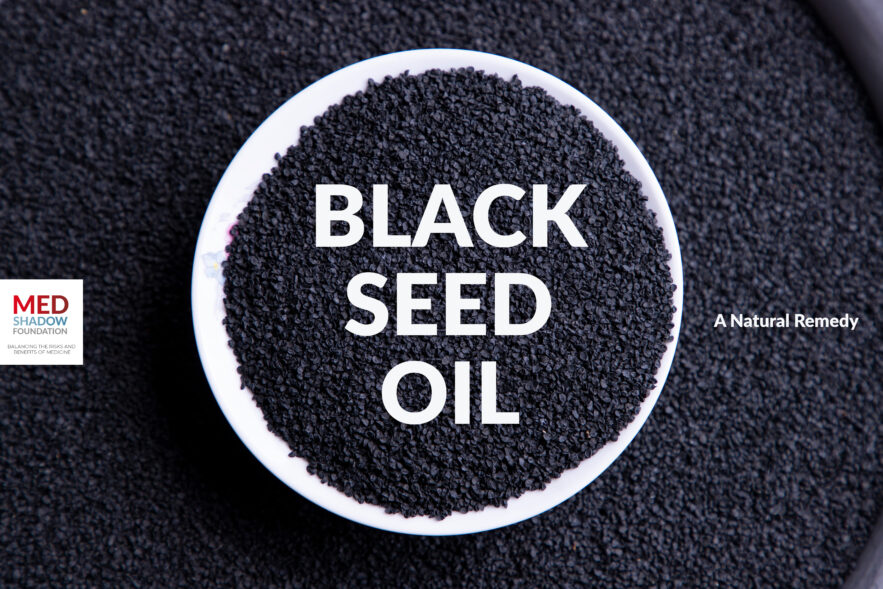When focused on wellness, many MedShadow Foundation readers understand the importance of natural products. As we strive to avoid the harmful side effects of medication, natural wellness options can be a useful source of nutrients or healing factors.
What Is Black Seed Oil Good For?
One such remedy that has caught on in recent years is the use of black seed oil. This oil has been used for centuries in traditional medicine for its various health benefits. In this article, we will explore what black seed oil is, its history, and its potential benefits for body systems, such as the skin, hair, weight loss, and immune system support.
Black seed oil is rich in antioxidants, which have been found to benefit health in a number of ways.
What Is Black Seed Oil?
What is black seed oil made from? Black seed oil is pressed from the seeds of a flowering shrub called Nigella sativa. The black seed oil is rich in thymoquinone, which is a compound that has anti-inflammatory and antioxidant properties. Initial studies have shown its benefits in fighting cancer.
It also contains other essential fatty acids, including linoleic and oleic acids, which are important for maintaining healthy skin and hair. You may see black seed oil also called “Nigella sativa” directly, or also “black cumin” oils.
Where Do I Find Pure Black Seed Oil?
Black seed oil is available in both liquid and capsule form and can be found in health food stores or online. It is important to find trusted and reliable sources for your oil. Search for high quality and organic black seed oil. Try to find 100% pure black seed oil, or search the terms “therapeutic grade.” While the Food and Drug Administration (FDA) does not test supplements for safety or efficacy, it is a product the organization labels as “generally safe.”
Another great tactic is to seek Black Seed Oil that is certified by the U.S. Department of Agriculture. USDA certified oils. This means that the oil is confirmed by the USDA to be 100% organic and natural. MedShadow offers more advice on selecting safe supplements here.
The History of Black Seed Oil
The black seed oil has a long history of use in traditional medicine. It was first mentioned in the Bible as a remedy for digestive issues and was also used by ancient Egyptians for its healing properties. In Islamic medicine, the black seed oil is referred to as the “remedy for all diseases” and was used to treat a variety of conditions, including:
- respiratory issues
- digestive problems
- and skin conditions
Today, black seed oil is still used in many parts of the world for its various health benefits.
Black Seed Oil Benefits for Skin
Black seed oil has a number of potential benefits for the skin. Its anti-inflammatory properties can help reduce redness and swelling, making it a great remedy for acne and other skin conditions. It also has moisturizing properties that can help hydrate the skin, leaving it looking and feeling soft and supple. Additionally, black seed oil has been shown to have anti-aging properties, helping to reduce the appearance of fine lines and wrinkles.
To use black seed oil for the skin, simply apply a small amount to the affected area and massage it gently into the skin. You can also mix it with other oils or skincare products to enhance its benefits. However, it’s important to note that black seed oil can cause skin irritation in some people, so it’s best to do a patch test before using it in many areas.
Black Seed Oil Benefits for Hair
Black seed oil is also great for promoting healthy hair. Its essential fatty acids help to nourish the hair follicles, promoting healthy hair growth. It also has antifungal and antibacterial properties that can help reduce dandruff and other scalp conditions. Additionally, black seed oil can help to strengthen the hair, making it less prone to breakage and split ends. Studies have shown that the use of the oil can reduce hair fallout by 76%.
To use black seed oil for the hair, simply massage a small amount into the scalp and hair, focusing on the roots. Leave it on for at least 30 minutes before washing it out with a gentle shampoo. You can also mix it with other oils or hair care products for added benefits.
Black Seed Oil Benefits for Weight Loss
The black seed oil has been shown to have potential benefits for weight loss. It contains compounds that can help to regulate blood sugar levels, reducing cravings and promoting feelings of fullness. Additionally, black seed oil has been shown to have thermogenic properties, meaning it can help to boost metabolism and increase fat burning.
To understand what is black seed oil good for when it comes to weight loss, it is important to follow a healthy diet and exercise regimen along with your intake. You can take black seed oil supplements or add them to your food as a condiment or salad dressing. However, it is important to note that black seed oil should not be used alone as a substitute for a healthy lifestyle.
Black Seed Oil Benefits for Immune System Support
The black seed oil has been shown to have potential benefits for immune system support. Its anti-inflammatory and antioxidant properties can help to reduce inflammation and oxidative stress in the body, which can contribute to a weakened immune system. Additionally, black seed oil has been shown to have antimicrobial properties, meaning it can help to fight off harmful bacteria and viruses.
To use black seed oil for immune system support, simply take it as a daily supplement. You can also add it to your meals or use it as a condiment to enhance its benefits.
How to Use Black Seed Oil
Black seed oil can be used in a variety of ways, depending on what you’re using it for. It can be taken as a daily supplement in capsule form (such as a black seed oil pill) or added to your meals as a condiment or salad dressing. Additionally, you can use it topically for the skin and hair by applying it directly to the affected area or mixing it with other oils or skincare products.
When using black seed oil, it’s important to start with a small amount and gradually increase your intake as needed. Additionally, it’s important to choose high-quality oil from a reputable source to ensure you’re getting the full benefits.
Side Effects of Black Seed Oil
While black seed oil has generally been considered safe at dosages between 200 and 2,000 mg per day for most adults, there are side effects to be aware of when using products. Some people may experience skin irritation or allergic reactions when using black seed oil topically. Additionally, it can interact with certain medications, so it’s important to consult with your healthcare provider before using it if you’re taking any medications or have any underlying health conditions. Some medications, such as those for blood pressure or thyroid conditions may cause the medication to be work a bit too well, causing adverse effects.
In studies on rats, high dosages of black seed oil were found to cause liver and kidney damage. The oil may also slow clotting abilities, making bleeding more likely and riskier.
As with many supplements and medications, there are limited studies on black seed oil. Because it may impact each person in a unique way, it is best to speak to your physician prior to use.
Black Seed Oil Medication Interactions
Though some benefits have been proven, black seed oil may interact with medications you are currently taking. It is always best to consult your healthcare provider before introducing any new medication (prescription or over-the-counter) or supplement (vitamin, oil, herb, etc.).
Some of the drugs known to interact with black seed oil include:
- Norvasc (amlodipine): may over-correct blood pressure when used together
- Anticoagulant/Antiplatelet drugs: may slow clotting, increase the rate of bruising or bleeding
- Cyclosporine: reduce effectiveness of the drugs
- Immunosuppressants: reduce effectiveness of drugs
- Diabetic medications: when used in conjunction may drop sugar levels too low
- Synthroid (levothyroxine): may lower TSH levels too rapidly
- SSRIs: may increase serotonin levels too much; may experience cardiac issue, seizure, nausea/vomiting
- Sleep/sedation drugs: may increase effects too much, causing slowed breathing, breathing problems, excessive sleepiness
- Water pills (diuretics): may drop potassium levels too quickly or too much when used together
As you can see, many of the benefits of black seed oil, when used in conjunction with drugs with the same goal, tend to create an overactivity of the medication’s intention. For example, if you are on blood thinners (anticoagulants), your medication has an intent to thin the blood. Black seed oil also thins blood. Adding the supplement to your medication you’re already taking may produce too much thinning of the blood, therefore putting you in danger.
Always consult your doctor before adding a supplement such as black seed oil to your currently prescribed medications. Even tapering dosages or attempts to deprescribe should be reviewed with your doctor.
What Does Black Seed Oil Do?
Overall, black seed oil has a number of potential health benefits that may make it worth trying. Its anti-inflammatory, antioxidant, and antimicrobial properties make it a great remedy for a variety of conditions, including skin and hair issues, weight loss, and immune system support.
However, it’s important to start with a small amount and consult with your healthcare provider before using it. If you have any concerns, such as health conditions or interactions with other medications or supplements, do not start the use of black seed oil until you have consulted with your doctor.
With its long history of use in traditional medicine and its many potential benefits proven through a variety of studies, the black seed oil is a natural remedy that may improve your health.






